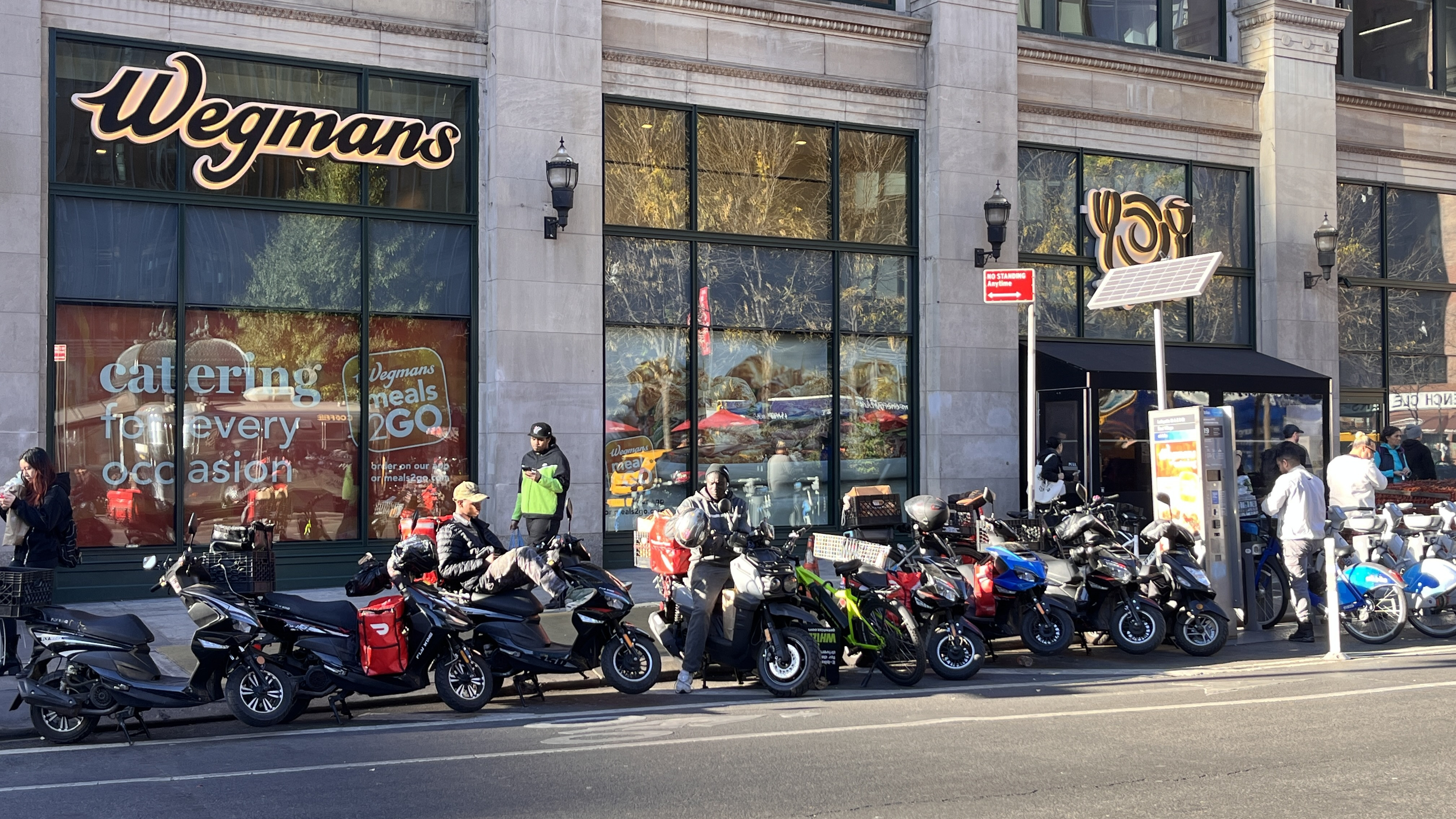Manhattan’s streets are buzzing with activity, and a significant part of this energy comes from the thousands of delivery workers navigating the city on e-bikes. While discussions around regulating this rapidly growing sector continue, one company, Whizz, has emerged as a key player, providing a sustainable and practical solution for delivery workers: Whizz E-bikes Rental In Manhattan. Founded three years ago by Mike Peregudov, Alex Mironov, Ksenia Proka, and Artem Serbovka, Whizz has been quietly but steadily transforming the landscape of e-bike usage in the city. Streetsblog recently interviewed CEO Peregudov to gain insights into Whizz’s operations and its perspective on the future of e-bike regulations in New York City.
 Mike Peregudov CEO of Whizz e-bikes rental in Manhattan, discussing urban mobility solutions.
Mike Peregudov CEO of Whizz e-bikes rental in Manhattan, discussing urban mobility solutions.
Addressing the Needs of Delivery Workers with E-Bike Rentals
Whizz’s inception was rooted in a deep understanding of the challenges faced by delivery workers, particularly recent immigrants. Peregudov explained, “The mission of the company is to help delivery workers enter the profession and start earning money.” Recognizing that many newcomers lack the financial resources or credit history to purchase an e-bike outright – often costing up to $2,000 – Whizz pioneered a rental model. This approach eliminates the high upfront cost and provides access to quality e-bikes for individuals seeking immediate employment in the booming delivery sector.
The rental model extends beyond mere bike provision. Whizz understands the demanding nature of delivery work, where bikes often endure daily distances of 80 miles or more, accumulating approximately 600 miles monthly. To address the inevitable wear and tear, Whizz’s rental service includes comprehensive maintenance. “We will not only rent out the bikes but we will maintain them and it will be included in the price,” Peregudov stated. This all-inclusive approach ensures that delivery workers have reliable equipment without the burden of unexpected repair costs.
Whizz E-Bikes: A Growing Fleet Across Manhattan
The demand for whizz e-bikes rental in Manhattan is evident in the company’s impressive growth. Currently, Whizz boasts over 3,500 electric bikes on the streets, doubling its active fleet year-over-year. In 2024 alone, Whizz rented bikes to more than 8,000 customers. This high turnover reflects the transient nature of the delivery profession, where the average career span is less than a year. The flexibility and affordability of renting from Whizz align perfectly with the needs of this dynamic workforce.
 Whizz e-bikes and other delivery mopeds parked outside Wegmans in East Village Manhattan, illustrating the demand for e-bike rentals in NYC.
Whizz e-bikes and other delivery mopeds parked outside Wegmans in East Village Manhattan, illustrating the demand for e-bike rentals in NYC.
Navigating the Complex Landscape of E-Bike Regulations
As the e-bike phenomenon has exploded in recent years, New York City has grappled with establishing effective regulations. Peregudov acknowledges the necessity of regulation, stating, “In my opinion, it should be regulated.” However, he also believes that current and proposed regulations are “over complicated” and may not be the most effective solutions.
One significant concern is battery safety. The influx of unregulated e-bikes led to a market saturated with low-quality batteries, contributing to fire hazards. While the introduction of “UL certification” is a positive step, Peregudov points out that the lifespan of batteries means it will take time to phase out older, potentially unsafe batteries. Whizz, however, has prioritized safety from its inception, using “the best available batteries and battery cells in the market.” This commitment is reflected in their remarkable record of zero battery fires in their fleet.
Beyond battery safety, regulating e-bike behavior, such as speed and power, is another challenge. The current classification system (Class 1, 2, and 3 e-bikes) adds complexity, particularly with varying regulations across state lines. Peregudov suggests simplifying regulations, proposing that eliminating Class 3 e-bikes, which can reach speeds of 25 mph, might be beneficial. He argues that Class 2 e-bikes (up to 20 mph) are sufficient, and for higher speeds, mopeds are more appropriate.
E-Bike Registration: A Misguided Approach?
Peregudov attended a City Council hearing regarding Intro 606, a bill proposing mandatory e-bike registration with the DOT. His experience at the hearing highlighted a disconnect between the emotional arguments for registration and the practical realities. He noted the Department of Transportation’s opposition to the bill, recognizing its impracticality. Furthermore, Peregudov emphasized the statistical context, pointing out that e-bikes are involved in a relatively small number of crashes compared to cars. He even shared Whizz’s data, revealing that up to 25% of their customers have been involved in collisions with cars, underscoring the broader traffic safety issues beyond just e-bikes.
Towards Sustainable Delivery: Collaboration is Key
Mayor Adams’ announcement of a new Department of Sustainable Delivery signals a growing recognition of the need for a comprehensive approach to managing the delivery industry. Whizz has been involved in initial discussions, participating in roundtables organized by the city. Peregudov believes that effective regulation requires collaboration, particularly with app-based delivery platforms like DoorDash and Uber.
He proposes leveraging the platforms’ existing onboarding processes to create a system where delivery workers are directed towards approved e-bike providers. “The platforms can create, together with the city, a database of e-bike providers and vendors,” Peregudov suggested. Drawing inspiration from European models, he also recommends exploring subsidies from platforms for workers who rent or purchase e-bikes from approved vendors. This incentivized approach could promote the adoption of safer, compliant e-bikes and contribute to a more sustainable and well-regulated delivery ecosystem in Manhattan.
Whizz e-bikes rental in Manhattan represents a practical and forward-thinking approach to supporting delivery workers and navigating the evolving landscape of urban transportation. As New York City continues to refine its e-bike regulations, the insights and experiences of companies like Whizz will be invaluable in creating effective and sustainable solutions.
